- On-road impressions of the new RX 350, RX350h hybrid and RX 500h performance hybrid
- Infotainment system and driving experience are vastly improved
- The RX 500h is surprisingly fun to drive
2023 Lexus RX Benefits From New Powertrains, New Tech and Refined Styling
More modern and much better to drive
Recent years of the Lexus RX have had three primary attributes to potentially win over midsize-SUV shoppers: distinctive styling, a lower-than-average price tag among its peers, and the perceived reliability of its parent company. But it's also been not all that exciting to drive, and it's let down by a non-touchscreen infotainment system with a frustrating and distracting user interface.
At least, those are the traits exhibited by the prior-generation RX, which dates back to 2016. Lexus is debuting a redesigned RX for 2023, replete with a range of new powertrains and other upgrades. Chief among them is — finally! — the removal of the much-hated touchpad controller.
What's under the RX's hood?
The entry-level RX 350 has long made do with a naturally aspirated V6 engine, but the new model lops off a couple cylinders but adds forced induction to make up for the power deficit. The 2023 RX 350 is driven by a turbocharged 2.4-liter four-cylinder pumping out 275 horsepower and 317 lb-ft of torque. Compared against the outgoing model, the new RX has 20 fewer horsepower but 50 more lb-ft.
Lexus says the front-wheel-drive RX 350 can accelerate from zero to 60 mph in 7.5 seconds, and opting for all-wheel drive drops the estimated acceleration time to 7.2 seconds. The last front-wheel-drive RX 350 we tested posted a 0-60 time of 7.9 seconds, so the new powertrain — plus weight savings of up to nearly 200 pounds — appears to afford slightly quicker acceleration. We also expect the new four-cylinder to be slightly more fuel-efficient as well. The transmission remains an eight-speed automatic and, once again, both front- and all-wheel-drive powertrains are available.
Lexus has stated that there will be a plug-in hybrid variant of the new RX known as the 450h+. Being a plug-in hybrid means it can drive short distances on all-electric power before switching over to regular hybrid operation with its gasoline engine. At the time of our review's publication, however, Lexus had not provided any information on what kind of plug-in hybrid powertrain the RX 450h+ will have or any other concrete details or specifications.
We do expect it will be more powerful than the 2023 RX 350h, which has a 2.5-liter four-cylinder engine and a hybrid system, a combined 246 horsepower and an estimated 0-60 mph time of 7.4 seconds. We wouldn't be surprised if the RX 450h+ ends up having the same powertrain as its smaller Lexus counterpart, the NX 450h+. That vehicle has a plug-in hybrid system that produces 302 hp and can drive about 37 miles on a fully charged battery.
The RX 500h F Sport Performance is a different beast entirely. It uses a turbocharged 2.4-liter four-cylinder engine, a six-speed automatic transmission and a hybrid system to produce a hearty 366 hp and 406 lb-ft of torque. Lexus says 0-60 mph will take a respectably quick 5.9 seconds. The last-generation RX 450h we tested, which had 308 hp, needed 7.3 seconds to get up to 60 mph.
All-wheel drive is standard for the RX 500h F Sport Performance, and Lexus says it's optimized to enhance traction on dry roads as well as in the more typical snowy or icy conditions. More secure handling and upgraded brakes specific to the RX 500h F Sport Performance should also add to the RX 500h's athleticism.
Lexus estimates the RX 500h F Sport Performance will achieve 26 mpg in combined city/highway driving. That's 2 mpg better than the RX 350, which has 91 fewer hp. More power and better fuel economy — what's not to like?
How does the RX 350 drive?
We had a chance to sample the first three RX models that will be available to the public starting later this year. The RX 450h+ was not yet ready for evaluation, but we did take spins in the RX 350 with the F Sport Handling package, the RX 350h and the top-of-the-line RX 500h F Sport Performance.
Any fears of missing out on the current model's venerable V6 engine can be put aside. The pairing of the new 2.4-liter turbocharged four-cylinder engine and eight-speed automatic makes the RX 350 feel more responsive and punchy than the outgoing V6 and its slower-shifting six-speed automatic. Due to the extra size and weight of the RX, it doesn't feel quite as quick as the smaller NX 350 (which sports the same engine), but the RX is far from underpowered.
Our test car was equipped with the optional F Sport Handling package, which, among various cosmetic enhancements, includes all-wheel drive, an adaptive suspension and grippier tires mounted on 21-inch wheels. We found the F Sport packages to be a weak point for the RX in previous generations due in large part for a very un-Lexus-like overly stiff and busy ride. We're happy to say the new-generation RX F Sport is a marked improvement in ride quality but we still found it to be a bit stiff and jittery on less than perfect road surfaces. But it's not so busy as to be a deal-breaker, so if you like the styling changes, both inside and out, that the F Sport package brings, you'll probably be OK with the stiffer ride.
What about the RX 350h?
The RX 350h brings not only a change in powertrain but a change to the whole RX experience. In our time behind the wheel of the 350h, we felt this model best represents the new RX by combining efficiency with the comfortable qualities we've come to expect from Lexus. Ride control is excellent. Even with the additional weight of the hybrid powertrain, the 350h never felt too soft, nor did it lack composure down a twisty back road. The steering is well tuned and both accurate and not overly light or heavy, no matter which drive mode was selected.
Of course the combination of the naturally aspirated 2.5-liter four-cylinder engine and the continuously variable transmission (CVT) doesn't typically result in the smoothest or most refined powertrain on offer, but Lexus has worked its magic. We've found this pairing to be less than agreeable in other Toyota products, but with the extra isolation provided in the RX, the coarse and sometimes buzzy nature of the engine is all but eliminated in typical driving conditions. The added boost from the hybrid system brings a little extra oomph as well, making the hybrid a very easy vehicle to drive.
Trying out the awesomely powerful RX 500h F Sport Performance
The RX 500h F Sport Performance (that is indeed its full name) uses the main performance benefit of a hybrid system — namely instantaneous torque — to create the quickest RX on offer. Paired with the 2.4-liter turbocharged engine and a six-speed automatic in place of the RX 350's eight-speed unit (Lexus claims the six-speed works better for achieving its performance goals), the 500h uses an electric motor situated on the rear axle for more engaging performance.
Tapping into that extra power, and having it come from the rear wheels, gives the 500h a sportier feel, especially accelerating out of slow- and medium-speed corners. Combined with the 500h's sport-tuned all-wheel-drive system (it's not the same hardware as what you get on the 350 and 350h), adaptive suspension and rear-wheel steering, this RX is much closer in both feel and performance to its German rivals than ever before. Perhaps it's the extra weight of the 500h but we found the sport suspension to be less jittery than in the 350 model equipped with the F Sport package. It's also surprisingly fun on a back road and drives like a much smaller SUV. This definitely has enough performance to back up the RX's new looks.
How's the RX's interior?
The outside might not look radically different from the outgoing RX but the inside certainly does. Dominating the experience is a fully digital dashboard combined with a choice of a 9.8-inch or a 14-inch horizontally oriented touchscreen display. Everywhere you look it's a step forward from the previous model and the interior of the RX looks both more youthful and luxurious. Even in its most opulent trim level, the new RX doesn't ever look or feel like your elderly aunt's old Lexus. Build quality, as you'd expect, is exceptional.
The new chassis gives the RX a slightly longer wheelbase and that pays dividends for rear seat legroom. We had the occasion to spend nearly an hour in the back of an RX and came away noting the excellent legroom and comfortable sculpting of the rear seats themselves. Unlike the outgoing model, Lexus says it had no immediate plans to offer an RX with a third row of seats.
How's the RX's tech?
Lexus has finally done away with the much-maligned touchpad controller that made the user interface so clunky and difficult to interact with in the old RX. It instead uses a simple touchscreen, albeit punctuated with a pair of physical dials that allow you to quickly input the desired temperature for the front-seat climate system. We've tested this interface in several newer Toyota and Lexus products — including the new Toyota Tundra and Lexus NX — and while it's not as user-friendly as we'd like, it is significantly easier to navigate around the menus.
Navigation is available but only as a subscription, much like satellite radio. While we're not entirely sure how that will play with Lexus buyers, we did find the system easy to read at a quick glance and very accurate. Audiophiles can rest easy knowing the new RX continues to offer an excellent Mark Levinson system — this one features 21 speakers, 1,800 watts and a 9-inch subwoofer.
Standard on all RX models is Lexus Safety System+ 3.0, a suite of advanced driver aids that includes forward collision warning, automatic emergency braking, emergency steering assistance, lane keeping assistance and adaptive cruise control. We had ample time to experience the RX's adaptive cruise control and lane centering and came away impressed with their smoothness. Though we're not enamored with the touch-sensitive multifunction steering wheel mounted pads that activate the system, it was definitely stress-relieving on longer highway stretches and it's nice to see the safety suite as standard equipment.
Edmunds says
In the eight years since the RX's last redesign, luxury SUVs have become increasingly competitive, leaving the Lexus playing catch-up. The complete overhaul Lexus has given the RX for 2023 has thoroughly modernized its popular SUV and given it a fighting chance.
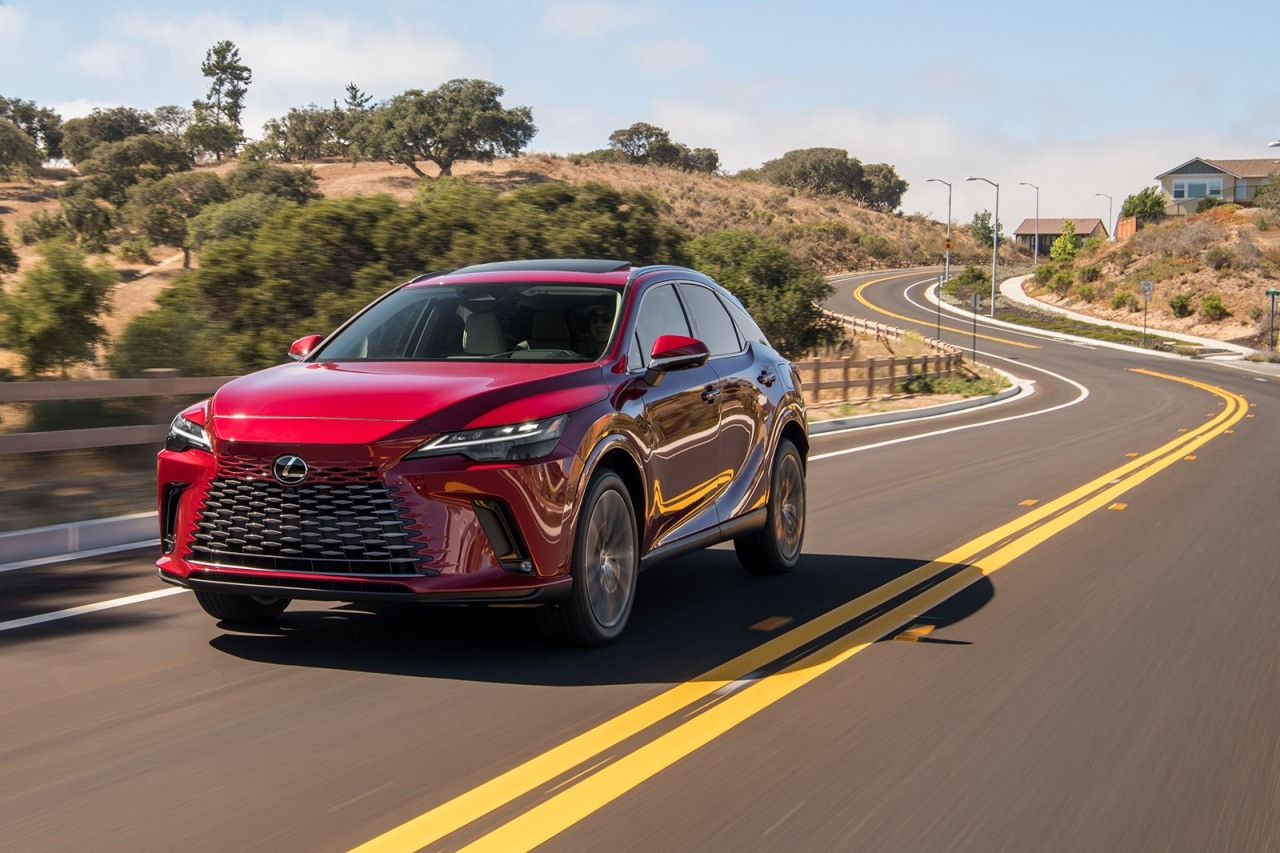





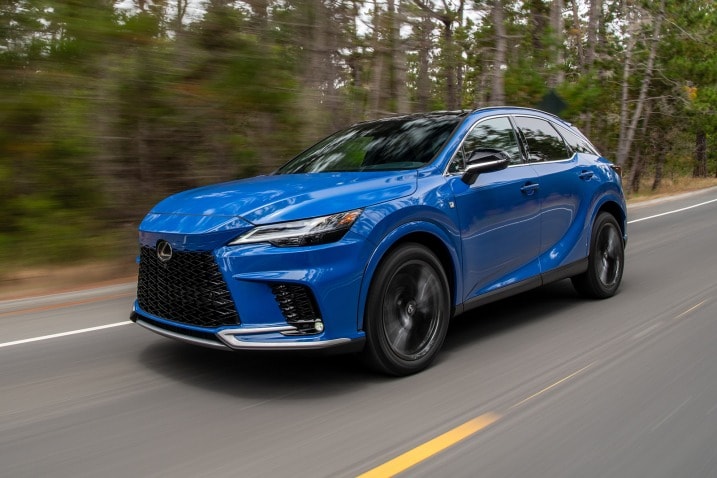
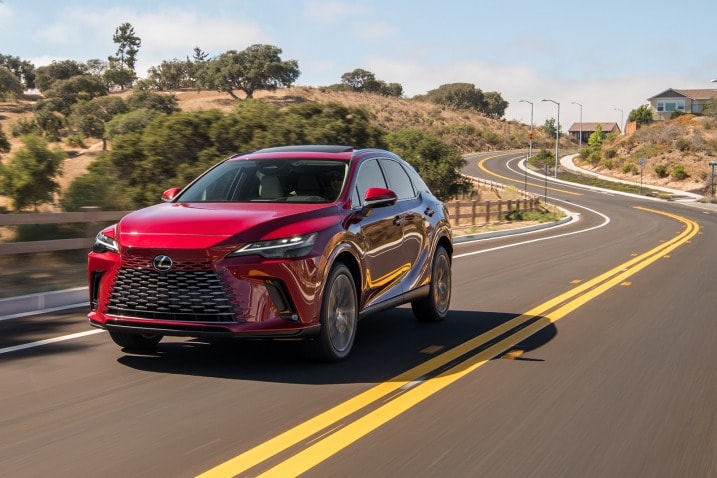
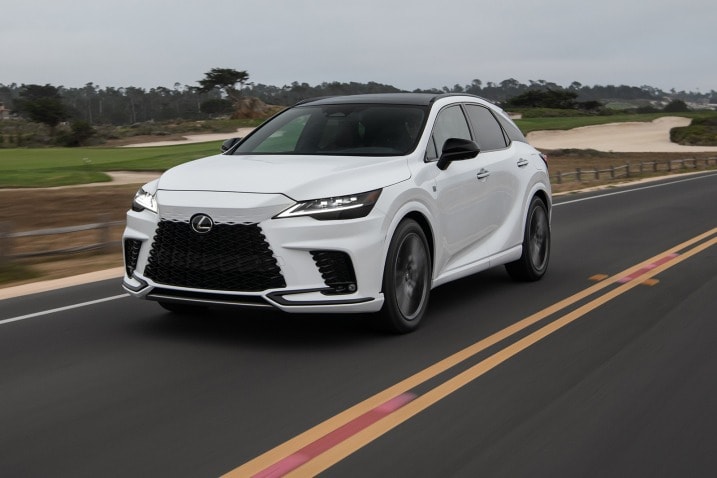

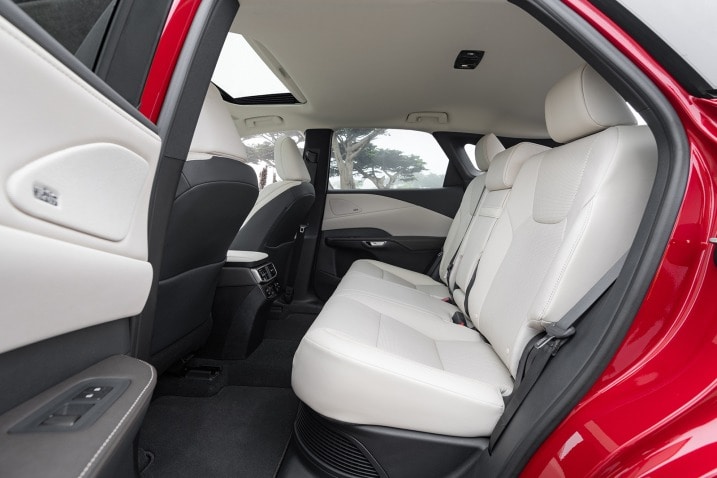
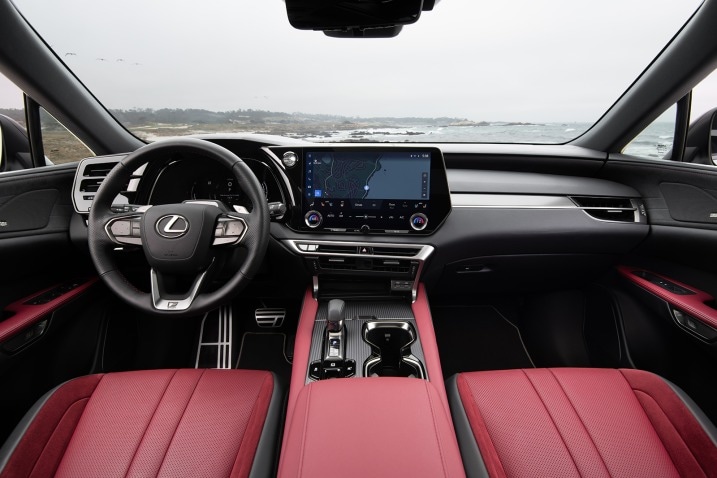
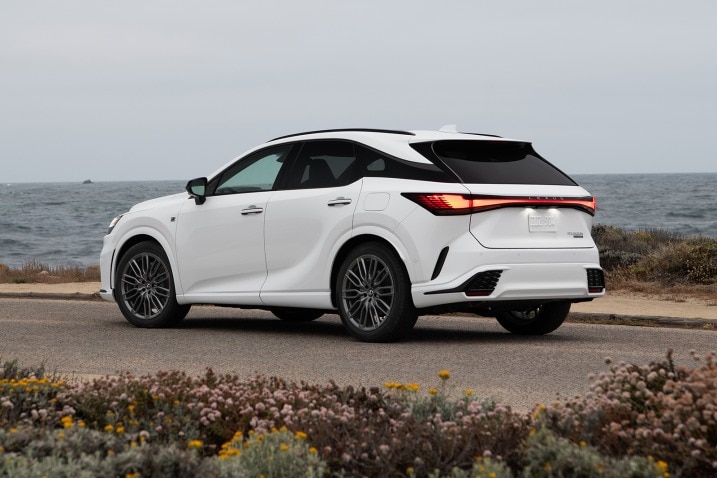
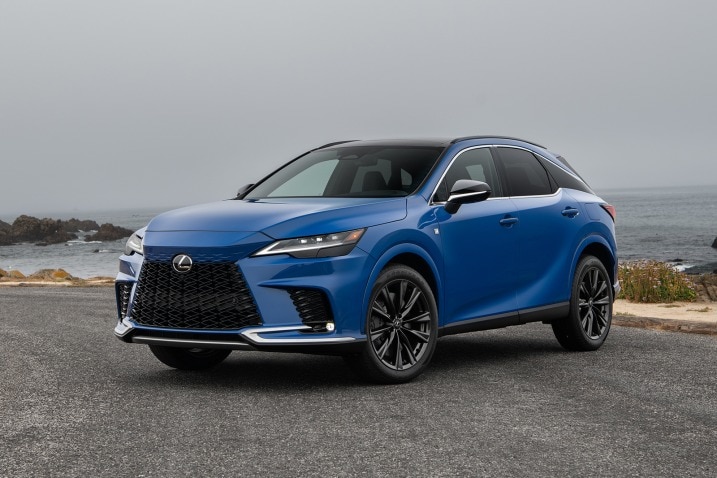
 by
by